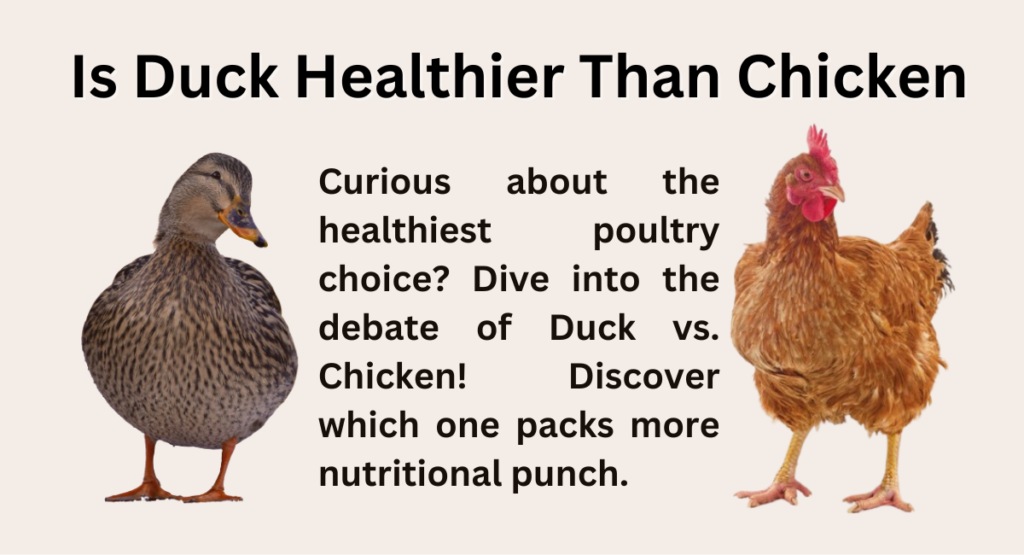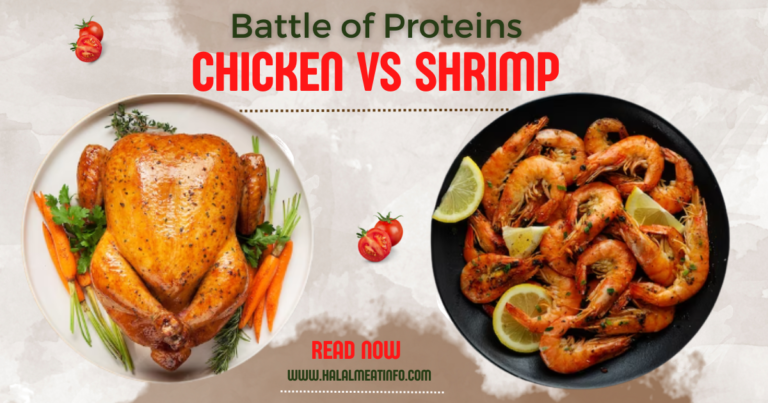Is Duck Healthier Than Chicken?
When selecting a protein source for your next meal, both duck and chicken stand out as excellent choices. However, the question often arises – Is Duck Healthier than Chicken? To answer this, we must delve into the nutrition profiles of both these fowls and consider factors such as their fat content, protein levels, and the variety of vitamins and minerals they contain. In this blog post, we will conduct a detailed comparison to help you make an informed decision for your dietary needs.

Differences between Chicken and Duck
Significant differences between chicken and duck are worth noting. Duck meat tends to be darker with a distinct, stronger flavor compared to the lighter, milder taste of chicken. Additionally, duck is relatively higher in fat, including heart-healthy monounsaturated fats. However, the skin of the duck contains most of the fat, so removing it can make the meat significantly leaner. On the other hand, chicken is generally leaner and has less fat overall, making it a preferable choice for low-fat diets. In terms of protein, both birds offer high levels, but chicken takes a slight lead in this department. Regarding vitamins and minerals, duck has higher levels of iron, which is essential for red blood cell production, while chicken is a great source of vitamins such as B6 and niacin.
Advantages and Disadvantages Of Duck Versus Chicken
Advantages of Duck:
- Duck meat is rich in iron, which aids in red blood cell production.
- It has a unique, strong flavor, making it a favored choice for those who prefer more robust-tasting meat.
- Duck contains a notable amount of heart-healthy monounsaturated fats.
Disadvantages of Duck:
- Duck meat tends to have higher fat content, which could be a concern for those on a low-fat diet.
- The skin of the duck is where most of its fat is stored. This means you might have to forego the tasty skin to make your meal healthier.
Advantages of Chicken:
- Chicken meat is lean, fitting well into low-fat diets.
- It boasts a mild flavor adaptable to various dishes and cuisines.
- Chicken serves as an excellent protein source with essential vitamins like B6 and niacin.
Disadvantages of Chicken:
- Chicken has less iron compared to duck meat.
- For those seeking a unique flavor, chicken might be considered too mild or bland.
Duck Nutrition vs Chicken
When we compare the basic nutritional facts, we can see some noticeable differences between duck and chicken.
Protein, Fat, and Calorie content
On average, a skinless, cooked chicken breast provides around 165 calories, 31 grams of protein, and 3.6 grams of fat. On the other hand, a similar portion of skinless, cooked duck delivers roughly 192 calories, 28 grams of protein, and 6.7 grams of fat. While chicken has less fat and fewer calories, duck offers a higher fat content which contributes to its unique flavor and texture.
Micronutrients: Vitamins and Minerals in Duck and Chicken
As for micronutrients, both fowls come packed with an array of vitamins and minerals. Chicken is a good source of vitamin B6 and niacin, both essential for the body’s metabolic functions. It also delivers selenium, a potent antioxidant countering cellular damage.
Duck, in contrast, boasts a rich supply of iron, providing more of the mineral than chicken. Iron is vital for producing red blood cells and transporting oxygen throughout the body. Duck is also rich in niacin and selenium, but outshines chicken in its vitamin B-12 content, a nutrient that’s crucial for brain function and the formation of DNA and red blood cells.
Cholesterol and Sodium Content in Duck and Chicken
When considering the cholesterol and sodium content, duck proves to be a healthier alternative. Although both duck and chicken contain cholesterol, a small amount of which is necessary for bodily functions, duck contains less. Excessive cholesterol intake is associated with a higher risk of heart disease, so choosing duck could help maintain healthy cholesterol levels. Moreover, duck contains significantly less sodium compared to chicken. Reducing sodium intake aids in maintaining healthy blood pressure and cutting cardiovascular disease risk. Therefore, for those monitoring their intake of cholesterol and sodium, duck may be a more suitable choice.
Health Benefits of Eating Duck Vs. Chicken
Both chicken and duck bring a wealth of health benefits due to their respective nutritional profiles.
Chicken, with lower calorie and fat content, is favored by those managing weight or adhering to a low-fat diet. The high protein content of chicken supports muscle development and aids in the repair of bodily tissues. The rich supply of vitamin B6, niacin, and selenium in chicken supports metabolic functions and acts as a potent antioxidant.
Duck, despite its higher fat content, offers its own unique set of benefits. Duck’s iron content combats anemia by supporting red blood cell production. Abundant vitamin B12 in ducks is vital for nerve cell health, DNA and red blood cell production. Additionally, the higher fat content in duck may prove beneficial for those on a ketogenic or other high-fat diet. It also delivers a richer, more savory flavor, making it an appealing choice for taste-conscious diners.
Appearance and Taste
The visual appeal and taste of duck and chicken are starkly different, adding another dimension to our comparison. Chicken has a light, almost white color when cooked, and its meat is tender and mild in flavor. This makes chicken highly adaptable, as it can seamlessly incorporate into various recipes and cuisines without overpowering other flavors.
Duck meat, on the other hand, is darker and has a richer, more robust flavor profile. The meat is denser, and the higher fat content often results in a juicy and succulent taste experience. Duck is known for its crispy skin when roasted, a distinctive feature that sets it apart from chicken. Its strong, unique flavor often makes it the star of the dish, savored by gourmets worldwide.
Popularity
When it comes to popularity, chicken undoubtedly takes the crown. It’s a staple in many households around the world due to its cost-effectiveness, mild flavor, and versatility in a multitude of recipes. Whether it’s a comforting chicken soup, a spicy chicken curry, or a simple grilled chicken salad, it’s hard to find a menu without a chicken dish.
Duck, on the other hand, is often considered a delicacy. Despite not being as universally consumed as chicken, duck holds a special place in certain regional cuisines, particularly in French and Chinese culinary traditions. From the iconic Peking duck to the delectable Duck a l’Orange, duck dishes are often reserved for special occasions or gourmet dining experiences.
Cooking Considerations
When it comes to cooking, both duck and chicken have their unique set of considerations due to the differences in their fat contents and flavors. Chicken, being leaner, cooks faster and risks drying out. Precise monitoring of cooking time and temperature ensures a tender, juicy result. Using marinades or brining can also enhance the moisture content and flavor of the chicken.
On the other hand, duck, with its higher fat content, requires a slower cooking method to render out the fat and achieve a crispy skin. The rich, fatty meat of the duck pairs well with bold, tart, or sweet flavors. Preventing overcooking is crucial for duck tenderness, and saving rendered duck fat enhances other dishes with added flavor. This can make a significant difference in both nutrition and taste, so it’s an important factor to bear in mind when choosing between duck and chicken.
FAQs
Both duck and chicken have their own nutritional benefits. Chicken, lower in fat and calories, is a preferable choice for weight management plans. Duck, on the other hand, is rich in iron and vitamin B12, making it a good choice for boosting red blood cell production and brain function.
Duck meat’s higher fat content generally contributes to a more flavorful profile. It has a richer, more robust taste compared to chicken, which has a mild flavor.
While both are poultry, their different tastes and textures mean they might not work as direct substitutes in all recipes. However, in many dishes, particularly those with bold flavors, duck can serve as an excellent substitute for chicken.
Chicken is more popular due to its mild flavor, versatility in recipes, and cost-effectiveness. Duck, although flavorful, is often more expensive and seen as a delicacy in many cultures.
Conclusion
In conclusion, both duck and chicken have their unique advantages depending on individual dietary needs, cooking preferences, and flavor inclinations. Chicken, with its lean protein, versatility in cooking, and cost-effectiveness, continues to be a staple in many diets worldwide. Conversely, duck, with its rich flavor, nutritional benefits, and status as a gourmet delicacy, offers a delicious alternative for those seeking variety or adhering to certain dietary regimens. Ultimately, the decision between duck and chicken should align with one’s health goals, culinary preferences, and budget considerations.






